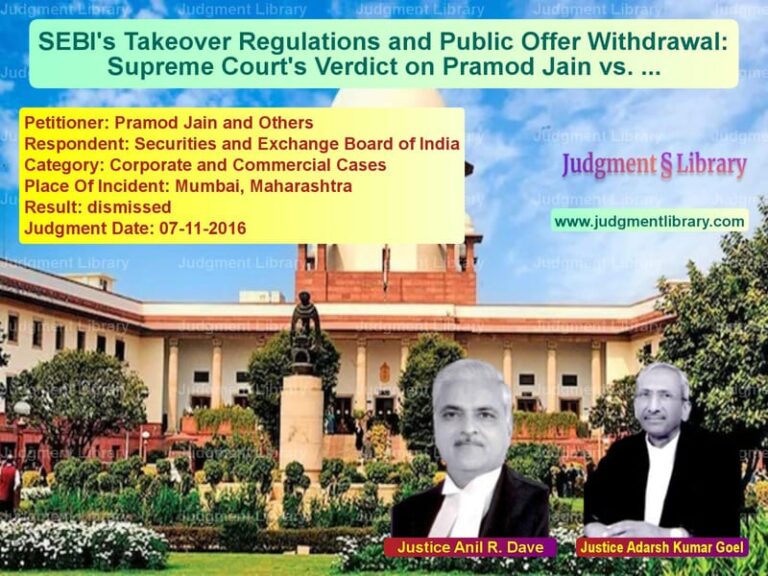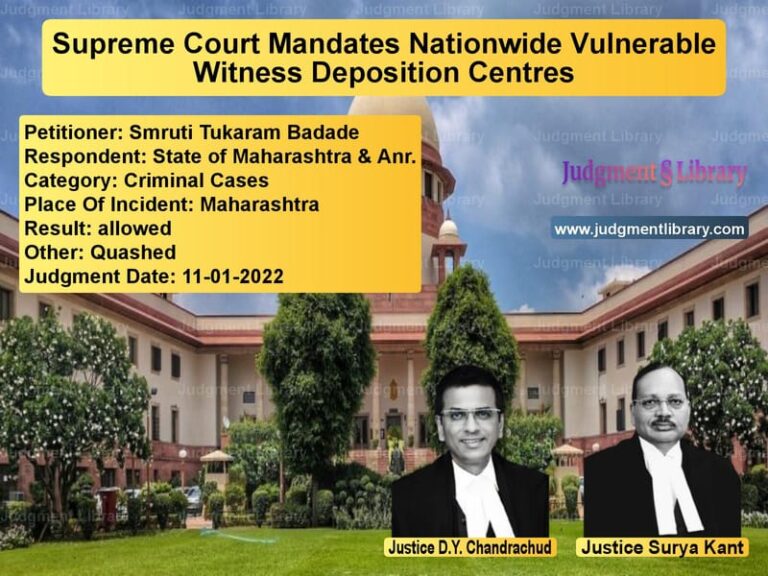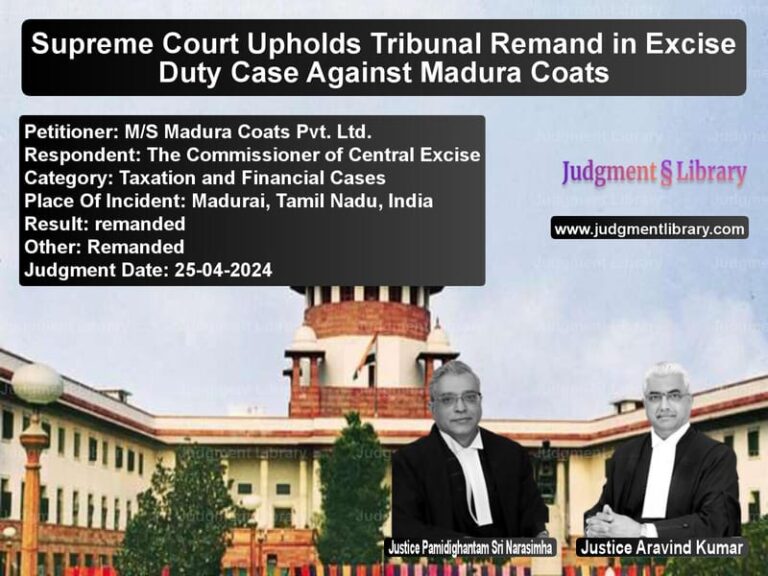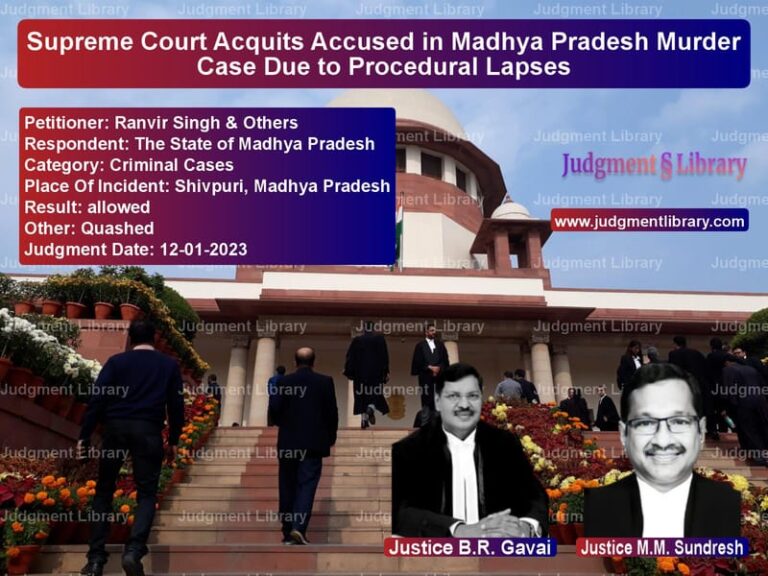Murder Conviction Upheld: Supreme Court Affirms Life Sentence in Kolkata Shooting Case
The case of Sudip Kumar Sen @ Biltu v. State of West Bengal & Ors. is a landmark ruling where the Supreme Court upheld the conviction of the accused under Section 302 read with Section 34 IPC. The appellants were found guilty of conspiring and executing the murder of Saikat Saha in a public shooting at Shakherbazar, Kolkata. This case highlights the role of eyewitness testimony, forensic evidence, and the doctrine of common intention in criminal law.
Background of the Case
The prosecution alleged that on January 13, 2002, at around 8:30 PM, the complainant Gora Das (PW-1) and his friends were having tea at a local tea stall when a group of accused, including:
- Sudip Kumar Sen @ Biltu (A-3)
- Goutam Ghosh (A-1)
- Tapas Das @ Bhambal (A-2)
- Sankar Das @ Bhai (A-4)
- Apu Chatterjee @ Soumitra (A-6)
arrived at the scene and confronted the victim, Saikat Saha. The group accused the victim of not meeting their associate, Jishu da, as instructed.
The Crime
According to eyewitness PW-6 (Sandipan Majumdar):
- Sudip Kumar Sen (A-3) began abusing the victim and demanded an explanation.
- Apu Chatterjee (A-6) allegedly exclaimed that “the men of Khoka must be eliminated for peace to prevail.”
- Tapas Das (A-2) and Sankar Das (A-4) grabbed the victim, restraining him.
- Goutam Ghosh (A-1) and Sk. Kochi (A-5) then fired at the victim, causing fatal gunshot injuries.
The victim, Saikat Saha, was immediately transported to Calcutta Medical Research Institute, where Dr. Debasish Pal (PW-9) declared him dead.
Investigation and Charges
Based on the complaint by Gora Das (PW-1), the police registered FIR No. 12 of 2002 at Thakurpukur Police Station. The investigation was conducted by PW-13 (A.K. Ghosh), who arrested the accused and recorded statements of key witnesses.
Following the investigation, a chargesheet was filed under:
- Section 302 IPC (Murder)
- Section 34 IPC (Common Intention)
- Section 120-B IPC (Criminal Conspiracy)
- Sections 25 and 27 of the Arms Act (Possession and use of firearms).
Trial Court Proceedings
The Additional Sessions Judge, Alipore, found the accused guilty based on:
- Eyewitness testimony of PW-6 (who provided a detailed account of the crime).
- Forensic reports confirming the cause of death as gunshot wounds to the chest.
- Recovery of weapons and other corroborative evidence.
On September 24, 2012, the trial court convicted the accused under Section 302 read with Section 34 IPC and sentenced each to life imprisonment with a fine of Rs. 5,000.
High Court Appeal
The accused filed Criminal Appeal No. 544 of 2004 before the Calcutta High Court, arguing that:
- There were contradictions in the testimony of PW-6.
- The prosecution failed to prove a “common intention” to kill.
- Evidence was manipulated by law enforcement.
The High Court dismissed the appeal, affirming the trial court’s findings.
Appeal Before the Supreme Court
The accused approached the Supreme Court, reiterating their arguments. Their counsel contended:
- The eyewitness’s testimony was unreliable.
- The prosecution failed to establish a direct connection between all accused.
- Some accused (A-2 to A-4 and A-6) did not fire the shots and should not be convicted under Section 302 read with Section 34 IPC.
Supreme Court’s Analysis and Judgment
1. Reliability of Eyewitness Testimony
The Supreme Court ruled:
“The testimony of PW-6 is consistent, credible, and unshaken despite extensive cross-examination. His presence at the scene and his prompt statement to the police lend further credibility.”
2. Doctrine of Common Intention
The Court held:
“Section 34 IPC applies when a criminal act is done by multiple persons in furtherance of a common intention. The accused arrived together, acted in a coordinated manner, and facilitated the shooting.”
3. Conviction of Non-Shooters
The appellants argued that only the shooters should be held liable. The Court rejected this claim, stating:
“The appellants had a clear common intention to eliminate the victim. The presence of those who restrained the victim was integral to the execution of the crime.”
Final Judgment
The Supreme Court dismissed all appeals, ruling:
- The life sentence was upheld for all accused.
- The fines of Rs. 5,000 each remained.
- There was no miscarriage of justice.
Key Takeaways
- Eyewitness testimony is crucial in criminal trials.
- The doctrine of common intention ensures accountability beyond the actual perpetrators.
- Coordinated criminal actions can lead to collective liability under Section 34 IPC.
- The Supreme Court prioritizes justice over procedural technicalities.
Conclusion
The judgment in Sudip Kumar Sen @ Biltu v. State of West Bengal reaffirms that criminal responsibility extends beyond the immediate act of shooting. The ruling strengthens jurisprudence on collective liability in premeditated crimes.
Don’t miss out on the full details! Download the complete judgment in PDF format below and gain valuable insights instantly!
Download Judgment: Sudip Kumar Sen @ Bi vs State of West Bengal Supreme Court of India Judgment Dated 07-01-2016.pdf
Direct Downlaod Judgment: Direct downlaod this Judgment
See all petitions in Murder Cases
See all petitions in Attempt to Murder Cases
See all petitions in Judgment by T.S. Thakur
See all petitions in Judgment by R. Banumathi
See all petitions in dismissed
See all petitions in supreme court of India judgments January 2016
See all petitions in 2016 judgments
See all posts in Criminal Cases Category
See all allowed petitions in Criminal Cases Category
See all Dismissed petitions in Criminal Cases Category
See all partially allowed petitions in Criminal Cases Category







